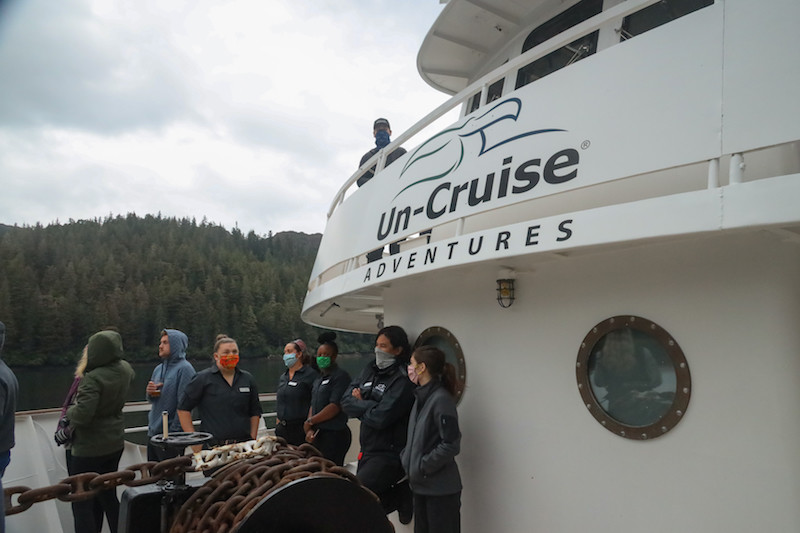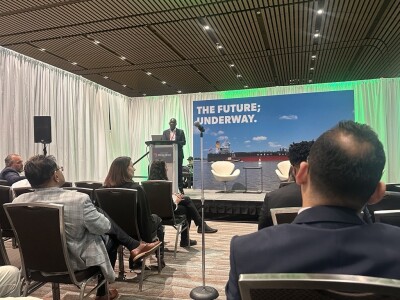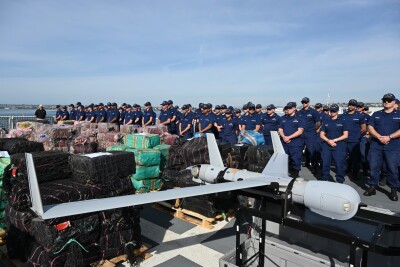The Coast Guard has published Marine Safety Information Bulletin 02-21 Change 3 (“Covid-19 Safety Requirements in the Maritime Transportation System”) which allows mariners on “non-passenger-carrying commercial vessels operated by a team of mariners who all live on the vessel” to be exempt from mask-wearing requirements.
A mask will still be required when the vessel receives persons who are not a part of the crew that live on the vessel.
The previous guidance regarding the enforcement of mask wear in outdoor areas remains in effect. Though the CDC is no longer requiring mask wear in outdoor areas, operators of conveyances and transportation hubs, at their discretion, may require masks to be worn in outdoor areas. An outdoor area on a vessel is a space that is permanently open to the weather on one or more sides and, if covered by a deck or canopy, any spot on the overhead less than 15 feet from the nearest opening. This updated guidance does not supersede any federal, state, local, tribal, or territorial laws, rules, and regulations that still require the wearing of masks in outdoor areas of conveyances and while outdoors on transportation hubs.
Conveyance operators must continue to require all persons onboard to wear masks when boarding, disembarking, and for the duration of travel, unless they are located in outdoor areas of the conveyance (if such outdoor areas exist on the conveyance). Operators of transportation hubs must require all persons to wear a mask when entering or while indoors on the premises of a transportation hub.
Vessel operators are reminded that operational limitations including vessel stability and egress requirements may limit the number of people on each deck. Masters and crew remain responsible for ensuring the vessel remains in compliance with the applicable requirements.
Vessel and port operators are encouraged to monitor the CDC website at https://www.cdc.gov/ for the most up to date guidance.
Vessels (Conveyances): Vessel operators must use best efforts to ensure that any person on the conveyance wears a mask when boarding, disembarking, and for the duration of travel that is indoors. Depending on the circumstances, best efforts include:
- boarding only those persons who wear masks;
- instructing persons that federal law requires wearing a mask on the conveyance and failure to comply constitutes a violation of federal law;
- monitoring persons on board the conveyance for anyone who is not wearing a mask and seeking compliance from such persons;
- at the earliest opportunity, disembarking any person who refuses to comply or moving them to an outdoor area;
- providing persons with prominent and adequate notice to facilitate awareness and compliance of the requirement of this order to wear a mask; best practices may include, if feasible, advanced notifications on digital platforms, such as on apps, websites, or email; posted signage in multiple languages with illustrations; printing the requirement on transit tickets; or other methods as appropriate.
Vessel or facility operators, owners, or companies should provide clear guidance as to when wearing a mask would create a risk to workplace, health, safety or job duty for crew members and facility personnel. The company guidance should address specific tasks that cannot be accomplished safely while wearing a mask. A blanket policy cannot be issued to exempt all persons from wearing a mask at all times. Crewmembers and facility personnel may be exempt from wearing a mask only when actively performing the task and should immediately wear a mask when the task is complete. Since passengers should refrain from instances where wearing a mask may present a risk, this exemption does not extend to passengers.





